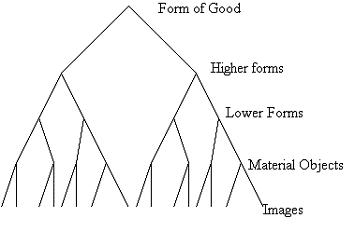

|
| "The good man understands what is right, the bad man understands profit." Confucius |
In this essay, we will explore the Form Goodness and how goodness triumphs over all forms of evil. Plato's conception of goodness will provide the framework for our exposition. In this time when evil appears to be defeating all instances of integrity or justice, it's important for us to realize precisely how goodness is triumphant over corruption, criminality, and mindlessness.
Because most people throughout the world have lost all understanding of what Goodness is, they can no longer identify or recognize evil!Americans like to think that if a tyranny such as that in Nazi Germany were present and growing in America they'd unquestionably be able to see it. But Americans, under former President Trump's regime, came very close to living under a fascist regime in a militaristic, imperialistic, police state--exactly the same as Nazi Germany in essence--but Americans didn't recognize it and are again allowing Democracy to be imperiled by Trump and the Republican Party, which has become a Trump cult!
In this essay we are examining intrinsic goodness (agathosune), especially as a personal quality, with stress on the kindly (rather than the righteous) side of goodness
A large percent of the people worldwide are so totally brain-dead, their ability to think for themselves so completely destroyed, that they accept the counterfeit as the real, the vile as the good, a bombastic, narcissistic ignoramus such as Trump as a Leader.We live in an ersatz world, like the story of the emperor who was naked but pretended to be robed in purple splendor, as in the fable in which the people became insane from drinking poisoned water, but since everyone had become insane, they all considered the others to be quite normal.
Because of our benighted condition, the important question now becomes: In such a deranged world, how can we regain a sense of what is good, what is real? How can we re-attain the ability to recognize the evil state our society is in, the debilitated mental, moral, social state we are in as human beings? Can we simply look around us and find exemplary people who can become our new models of goodness and excellence? Can we examine the current world societies and discover one which could serve as an archetype of a good social order? No!
We must recognize that most of the human population is totally incapable of rational thought so that they're unable to judge who and what is good or excellent or exemplary. Also, it's essential for us to realize that all social institutions have become totally debased into destructive, perverting scams, looting operations, criminal schemes. We can't regain awareness of what is good and evil by reference to the ordinary world.
"Plato's thought grew out of a battle for civilization--a battle without which civilization would have been smothered in its cradle. We have before us both the opportunity and the obligation to complete Plato's work, in science, in epistemology, and most of all in defeating the oligarchist descendants of Persia in our own time. To do this, we must bring before us the real Plato."
Charles Tate, The Truth About Plato, 1981
The Unexpected Solution to Our Problem It turns out that there is only one genuine, workable solution to our problem--one that is most surprising and unforeseen. We can regain a sense of what is evil--and, concomitantly, what is good, by understanding Plato's concept, reality, and process of the Form Goodness!
Regaining an understanding of what is good, what is real, what is workable is not something we can attain in the ordinary world, the world where everything--all persons, events, capabilities, objects--have become so debased and corrupted that they've lost their essence, their very being.
To be able to understand again what is good, to be able once more to recognize evil, and to create good people and good institutions, we must work to comprehend Plato's teachings concerning the Form Goodness, which is a reality in the higher, transcendent domain. Plato had ascertained the reality and activity of the Essence Goodness in his ongoing dialectical interchanges with Socrates, with his other teachers, and with his fellow-students. At present, through dialectical interchange with the few genuine philosophers alive, we can attain knowledge of the Essence of Goodness as it applies to all terrestrial entities. Through dialectical comprehension of Plato's concept, reality, and process of the Form Goodness, we can regain awareness of what it means to be a good person, what constitutes a good society, and how human existence can be ordered in such a way as to make it possible for all persons to achieve a good life.
"The object of Plato is to present to us the fact that there are in the soul certain ideas or principles, innate and connatural, which are not derived from without, but are anterior to all experience, and are developed and brought to view, but not produced by experience. These ideas are the most vital of all truths, and the purpose of instruction and discipline is to make the individual conscious of them and willing to be led and inspired by them." Alexander Wilder, Introduction to Thomas Taylor's Eleusinian and Bacchic Mysteries, 1891
In this essay, the second in a series of studies 1 of the Forms (the essence) of human civilization, we'll examine the ontological essence of the Form Goodness (áγαθοû ιδéα) and all its powers and associations. We'll then examine the necessity--in this era of colossal corruption, murder, and tyranny--of achieving the extra-ordinary abilities to understand--and realize--the Form Goodness.In previous essays we've examined the forms of human civilization: Justice, Beauty, and Commonwealth. We've previously seen how capitalism has from its inception destroyed--and continues to destroy--all civilized human values and principles. It's necessary for us, therefore, in this era of capitalist decimation and degradation of human life, to examine the Forms of human civilization in order to understand how to reinstitute these values and principles that are essential to human well-being.

In this series, we take the approach that humans overcome destructive terrestrial forces--such as capitalism--by understanding and realizing the Forms (the essence) of human civilization. In all historic eras, humankind has ordered its life according to specific societal archetypes and essences: patterns of behavior and objectives and concepts about supersensible realities. When these elements become deranged and deadly--as at present--then we can overcome these destructive patterns of behavior only by understanding the true Essence (Forms) of these elements and instituting them in society.To do this we must realize a new world by developing a new kind of person--with exceptional capabilities, creating a new world for the purpose of long-range development of new ideas, practices, and requisite capabilities.
"For it is possible, my son, that a man's soul should be made like to God, e'en while it still is in a body, if it doth contemplate the Beauty of the Good." Thrice-Great Hermes, The Key
Form as Essence
In gaining an understanding of Plato's conception of the Form Goodness, we'll use the term "essence" in this essay when referring to the Greek terms agathos eidos or agathou idea. The Greek phrase agathou idea is sometimes mistranslated in English as "the idea of the good." But in English, ideas are thought of as mind-dependent, whereas the Greek concepts eidos and ideas are not. In some contexts the Greek word-concepts eidos and idea are most effectively translated as form and idea. In this present study we're concerned with the ontological meaning and supersensible force of the Form Goodness, so we need to go beyond the ordinary connotations of Form such as "pattern," "archetype," or "idea" to the following meanings of the term "essence."
- From Latin essentia, from esse, to be or have being
- The characteristic or intrinsic feature of a thing, which determines its identity, fundamental nature
- The most distinctive element of a thing

A perfect or complete form of something, especially a person who typifies an abstract quality: He was the essence of gentility.
The unchanging and unchangeable nature of something which is necessary to its being the thing it is; its necessary properties
The nature of something as distinct from, and logically prior to, its existence
The true nature or constitution of anything, as opposed to what is accidental, phenomenal, and illusory
Something that has supersensible being, especially a spiritual or supernatural entity
The entity (person, operation, element) through which one comes to the notion, to the "key" to understanding an entity which, once arrived at, becomes the basis for all analysis of and "logical thinking" about the entity
In Greek, eideo means "to see" and what is seen is an eidos. For Plato, eidos means what is seen by the eye of the soul and is identical with essence.
Plato's Conception of Goodness
In his work The Commonwealth, Plato places the Essence Goodness at the pinnacle of ontological being.

"This, then which gives to the objects of knowledge their truth and to him who knows them his power of knowing, is the Essence Goodness. It is the cause of knowledge and truth; and so, while you may think of it as an object of knowledge, you will do well to regard it as something beyond truth and knowledge and precious as these both are, of still higher worth. . . . It is apt to say that known entities not only come to be known through Goodness, but they also owe their existence to Goodness. We must distinguish Goodness from existence, because Goodness is ontologically superior to existence in rank and power." 2 Plato conceives of the Essence Goodness as bringing terrestrial entities into existence, as well as making it possible for humans to know these entities. Plato thus posits the Primordial Essence Goodness as a creative force, along with the Deity. Any person who lacks the Essence Goodness does not possess genuine existence--he is a sub-human.
"As Plato's conception developed, he dwelt more and more upon the one ultimate Reality which binds all subordinate realities into an organic whole--the supreme unity of all that is. This he called the 'Idea of the Good.' Through the 'Idea of the Good' all special spheres of reality are united in One Ultimate Reality. This is the Source and Goal of all things--the Alpha and Omega. Toward It all that is moves. It is the end and Final Cause in the entire circuit of the universe--'the one far-off divine event to which the whole creation moves.' Whatever comes to any degree or stage of being does so through the attraction of the Idea of the Good. The universe in all its parts is realizing an End which is Good and the end or Goal functions in the entire process. As the idea of a loved one moves the lover toward her whom he loves, so the Idea of the Good moves the many parts of the universe toward Itself, the One Reality--the Absolute Good."
Rufus Jones, Studies In Mystical Religion, 1919
Plato affirms that God is of the Essence Goodness and wants all humans to embody the Essence Goodness."The Creator is of the Essence Goodness and He desires that all should partake of His nature: the Essence Goodness. . . Since this world of ours is beautiful and its Creator partakes of the Essence Goodness, then clearly the Creator has selected the primordial Essence of Beauty as the blueprint for the world . . ." TimaeusPlato examined his "world" with more insight into its true nature than any other person before or after him. He was aware of the hidden corruption of persons such as the fifth-century (BCE) Athenian oligarchs who condemned Socrates to death. Plato was cognizant that most persons follow the egomaniacal ideology expressed by Thucydides in the Commonwealth: justice is the will of the stronger, who commits evil deeds without compunction.
Even with his extraordinary discernment into the concealed depravity of plutocrats during his time and before, Plato still comprehended ultimate reality and the Creator as embodying Goodness, Justice, Beauty, and Truth. Plato understood spiritual essences such as Goodness, as not only being a quality which God embodied, but an ontological element with a reality and force of its own.
The Essence Goodness "gives the objects of knowledge their truth, " is the "cause of knowledge and truth . . . and reason," and "all that is right and beautiful." Thus, truth is, according to Plato, something in addition to the common conception of it as conformity to actuality; truth is also eternal verities.
According to Plato, it is essential that humans attain understanding of the Essence Goodness, because this is the highest and most essential form of knowledge and all entities become useful and advantageous by embodying this Essence.
"The Essence Goodness is the highest knowledge, and all other things become useful and advantageous only by their embodiment of this Essence . . . Without the Essence Goodness any other knowledge or possession of any kind will profit us nothing. Do you think that the possession of any other thing is of any value if we do not possess the Essence Goodness or the knowledge of any other thing if we have no knowledge of Beauty and Goodness?"We are able to act wisely only if we have gained understanding of the Essence Goodness through dialectical interchange.
"Anyone who is to act wisely in private or public must have achieved discernment of the Essence Goodness. . .""He who is not able by the exercise of his reason to define the Essence Goodness, separating it from all other objects and piercing, as in an encounter, through every kind of dialectical interchange, endeavoring to confute, not according to opinion but according to essence, and proceeding through all the dialectic energies with an unshaken reason--he who cannot accomplish this, neither knows the Essence Goodness, nor anything that is properly denominated the Good."
"Goodness is the measure of evil; it is not because of stupidity that we know stupidity but because of intelligence, which makes recognition of this privation possible." Frithjof Schuon, Logic and Transcendence
How Can We Become Aware of the Evil Condition We're In?
In a society that has lost its understanding of the Essence of Goodness--that mistakes the wicked leader for the good, the loathsome for the exemplary--the first task we face is to gain awareness of the evil, unreal, ersatz nature of our society. If we continue to believe that our culture is good and true, when it is in actuality evil and false, we have no hope of remediation or improvement.
Plato recognized evil as a reality in the affairs of humans; he experienced evil in the Athenian state's murder of his teacher Socrates and in his own misfortune of being sold into slavery by a tyrant. But unlike Goodness, which he saw as an ontologically independent, supersensible reality, he understood evil to possess no ontological being in higher reality, it is merely a terrestrial factor in ordinary human life and behavior.
"Evil, Theodorus, can never be done away with, for the Essence Goodness has its contrary. Evil has no being in the divine world, but haunts this terrestrial domain of our mortal nature. That is why we should make all speed to take flight from this terrestrial domain to the supersensible domain, becoming like the Divine so far as we can, attaining the Essence Goodness with the help of Wisdom. But it is no such easy matter to convince men that the reasons for avoiding wickedness and seeking after goodness are not those which the world gives. The right motive is not that one should seem innocent and good--that is no better, to my thinking, than an old wives' tale--but let us state the truth in this way. In the divine there is no shadow of unrighteousness, only the perfection of righteousness, and nothing is more like the divine than any one of us who becomes as righteous as possible. It is here that a man shows his true spirit and power or lack of spirit and nothingness. For to know this is wisdom and excellence of the genuine sort; not to know it is to be manifestly blind and base."
Plato, Theaetetus
"The purposes and forces of destruction are . . . not fully intelligent. They are not balanced, not fully animated. All forces of construction comprehend destruction. No forces of destruction comprehend construction. They are intelligent and wily in destruction, but fail to apprehend its futility."
Margaret Cameron, The Seven Purposes, 1918
Evil entities (persons, events, and objects) possess a terrestrial reality; we cannot pretend that they do not exist--as some metaphysicians attempt to do. However, evil entities possess a secondary, not ultimate, reality: they are perversions and degradations of ultimate realities such as Goodness, Truth, Beauty, and Justice. Evil possesses only a destructive force and a presumptuous grandiosity.
Plato saw evil as a destroying and corrupting element--the opposite of Goodness as the element which preserves and benefits. Evil, Plato asserted, takes over any entity (person, operation, element) which allows it to, and brings that entity to the point of non-existence.
"That which destroys and corrupts in every case is the evil; that which preserves and benefits is the good. . . Just as the vice of the body which is disease wastes and destroys it so that it no longer is a body at all, in like manner . . . evil attaches itself to an entity and dwelling in it with power to corrupt, reduces it to nonentity." Commonwealth XIt is a worse misfortune to commit evil, Plato asserted, than to be a victim of evil."We must at all times give our unfeigned assent to the ancient and holy doctrines which warn us that our souls are immortal, that they are judged, and that they undergo the most precise exactment of justice 3 after our separation from the body. Hence we must also hold it a lesser evil to be victims of great wrongs and crimes than to be doers of them. The man who crams his moneybags while his soul starves does not listen to these doctrines, or, if he does, he laughs them to scorn, as he supposes, and on every side ruthlessly snatches like a beast whatever he hopes will provide him with food and drink or the satisfaction of that brutal and gross pleasure that has no right to be called by a name derived from the goddess Aphrodite. He is blind and does not see that consequences attend the abominable wickedness of his acts of violence, for each wrongdoing adds the weight to a burden which the sinner must drag with him, not only while he lives his life on earth, but after he has returned to the afterlife whence he came--a journey unhonored and miserable altogether and always." Plato, Letter VII

|
The average American woman and man have been mis-educated and conditioned to believe that our present society is "normal:" okay, certainly not debased or evil, about the best that can be expected. They don't really know what's going on in the world, and they don't particularly want to know. They feel that our supposed democratic political system and our capitalist economic system are the best we could have.
|
|
| |||||
As indicated earlier, our approach in this series of studies operates on the principle that humans overcome demonic terrestrial forces--such as capitalism--by understanding and realizing the Essences (the Forms) of human civilization. The major element in this understanding and realizing process is what Pythagoras and Plato termed ascesis (ασκησισ).
In regard to human capabilities, goodness is intelligence and reason and evil is abject, deliberate stupidity, such as we are now witnessing in the Trump cult followers. For example, persons who are Trump adherents, whether they recognize it or not, have allowed themselves to become so stupid as to devolve into suicidal maniacs. In the face of the Covid pandemic, which has killed millions of humans, these lunatics refuse to use a vaccine regimen which has proven to prevent extreme infection and death. Not only have these idiots become suicidal, refusing to use a tested means of avoiding disease and death, but have become dangerous to others in refusing to use a vaccine which would make them non-infectuous to others.
Antivaxxers live in their own information ecosystem, an ecosystem that creates and sustains antivaxxers in the first place. They feel that their refusal to be vaccinated is a sign of personal strength, when it is actually a clear indication of utter, abject stupidity, feebleness, and debility.
In Platonic philosophia,4 ascesis designates not "asceticism," but "ascension:" self-disciplinary exercises involving active self-improvement and self-refinement. Platonic philosophia was not a theory of knowledge or a body of conceptual theories, but a love of (philo) and a search for wisdom (sophia). The ascesis aspect of philosophia was a way of living according to Higher Intellect (nous).How the various aspects of ascesis operated to bring a person in touch with the Higher Dimension of the Essences or Forms was best explained by Iamblicus in his Egyptian Mysteries:
"When our soul is lifted up [through ascesis] towards Essences higher than mathematical or metaphysical sciences, it can divest itself of the conditions which hold it in the bondage of every-day life; it exchanges its ordinary existence for another one, it renounces the conventional habits which belong to the external order of things, to give itself up to and mix itself with another order of things which reigns at that most elevated level of being."
| Level of Being | Characteristics | Entities | Faculties |
Manifestation
|
Spiritual | Supersensible Eternal | Unchanging Essences | Forms Dialectic | Higher Reason Spiritual Body
| Metaphysical | Mathematical Intellectual | Nonmaterial Concepts | Symbols Reason | Thought Subtle Body
| Material | Empirical Measurable | Tangible Persons | Objects Opinion | Senses Physical Body
| |
Through ascesis, our very being divests itself of the limitations of the lowest level of opinion, through ordinary reason at the metaphysical level, to the highest level of dialectical discernment of Essences and Forms.
"Philosophy is actually the release of the soul from the body--which in the philosophers' special language is called death. Achieving release from the body, the soul communes with Beauty, Goodness, and Justice in the higher realm of Divine Essences." Plato, Phaedo
This apperception of Forms is unrelated to memories from the past, sensory experiences in the immediate present, or contemplation of the future. The Platonic apperceptive experience in itself provides a content of its own, such as we otherwise only derive from our ordinary sensuous experience. As we develop this apperceptive meditative ability of the soul, we experience an inherent certainty that we're receiving no purely visionary content originating in our unconscious psychic or organic regions. We learn to experience realities which are called forth in higher consciousness without external perceptions, just as we are conscious of ideas in ordinary life when engaged in reflective thought, ideas independent of the physical world.
Plato taught that as we develop our evolving consciousness, a supersensible, purely spiritual content enters the feeling and perception of the Self. The apperceptive meditative life gives rise to a form of supersensible self-awareness. This self-consciousness can then be directed to the activity of the Will in realizing new capabilities--even to the point of moving beyond the realm of Forms to the One, as in Plotinus' experience.
In every-day life the activity of the will is consciously directed to external actions, including creation. There is, however, a spiritual expression of Will to which we pay little conscious attention: the activity of Higher Will which carries us from one stage of development to another in the course of our life. For not only are we engaged with different conceptual content within our soul, day after day, but our soul-life itself, on each succeeding day, evolves out of our soul-life of the day before. The driving force in this evolving process is the Higher Will, which in this field of its activity remains for the most part unconscious.
"Entering into that Cosmic Consciousness . . . we become . . . conscious of this cosmic existence, but likewise conscious in it, receiving it in sensation, but also entering into it in awareness. In it we live as we lived before in the ego-sense, active, more and more in contact, even unified more and more with other minds, other lives, other bodies than the organism we call ourselves, producing effects not only on our own moral and mental being and on the subjective being of others, but even on the physical world and its events by means nearer to the divine than those possible to our egoistic capacity." Sri Aurobindo, The Life Divine, 1949
Advanced self-awareness can raise this element of Higher Will, with all its unusual powers, into our conscious life. When we accomplish this, we gain a perception of a life of Will which has absolutely nothing to do with any elements of a sense-perceptible external world, but is directed solely to the inner evolution of the soul--independent of the physical world. We learn by degrees to enter into the living essence of our Higher Will, just as in the former kind of meditative life we entered into the Higher Consciousness.
Our conscious, deliberate experience of this element of Higher Will expands into the experience of an independent supersensible external world of its own substance. Having gained this aspect of Will, our supersensible self-consciousness finds itself in a supersensible realm filled with spiritual Beings and events.
Once we succeed in gaining genuine knowledge of the Essence of the Goodness of specific entities and elements, we can begin to rebuild and revivify ourselves and our culture. Plato understood that the rulers of a country must be the wisest persons--philosopher-benefactors who are able "to understand the Essence Goodness through rational insight and embody its ideals by ruling directly over the social order." Plato's ideal rulers emerged from an elite group, formed out of the highest talent and given the most thorough training in the disciplines of mathematics, science and philosophy. Plato believed that philosopher-rulers would prefer not to have to rule, since they are devoted to the study and cultivation of wisdom--they serve the state out of a sense of duty. Plato thought that anyone who wants power is de facto unsuited for it.
As we gain understanding of the Goodness of the various aspects of human life, we will have to join with others of like understanding to build cooperative commonwealth communities in which all people will have the right to a job with a living wage, genuine education in critical thinking, self-awareness, and critical consciousness, and the freedom to develop themselves in a manner they choose.
"When goodness grows weak,
When evil increases,
I make myself a body.In every age I come back
To deliver the holy,
To destroy the sin of the sinner,
To establish righteousness."
Bhagavad Gita
Notes:1 The first essay in the series was on the Form: Justice
2 This and all other renderings of Plato's writings in this essay are my own translations from the original Greek.